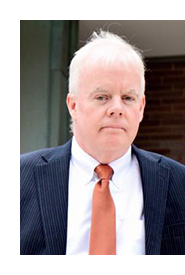GROOME GIVES SPEECH TO BALTIMORE COUNCIL ON FOREIGN AFFAIRS
 April 2023 — Professor Dermot Groome was recently invited to address the Baltimore Council on Foreign Affairs. His speech, “Closing the Impunity Gap for War Crimes in Ukraine” considered how the international legal principle of universal jurisdiction might be used to facilitate greater accountability for international crimes committed in Ukraine.
April 2023 — Professor Dermot Groome was recently invited to address the Baltimore Council on Foreign Affairs. His speech, “Closing the Impunity Gap for War Crimes in Ukraine” considered how the international legal principle of universal jurisdiction might be used to facilitate greater accountability for international crimes committed in Ukraine.
The Baltimore Council on Foreign Affairs is a non-partisan, not for profit association dedicated to fostering “serious discussions of American foreign policy [through] its distinguished speakers program.” Professor Groome was invited to address the Council on how the United States might help ensure that the perpetrators of grave crimes committed in Ukraine are held accountable. Groome highlighted universal jurisdiction (UJ), which gives courts around the world jurisdiction over grave breaches of the Geneva Conventions, as an important legal tool with the potential to close the impunity gap that now exits. Groome believes that we are at a moment where the historically untapped potential of UJ may be realized because of the ubiquity of atrocity videos coupled with the ability to exploit their evidential use with AI and open-source intelligence.
Groome also spoke about three new Federal laws that took effect in 2023 and herald new possibilities for the U.S. to engage with and support the work of the International Criminal Court.
A recording of Professor Groome’s presentation can be found on the Council’s YouTube channel.
Professor Groome also recently gave a lecture on universal jurisdiction to the J. Sherwood McGinnis Jr. War, Peace, and Justice Project.
Professor Dermot Groome is a Professor of Law and the Harvey A. Feldman Distinguished Faculty Scholar at Penn State Dickinson Law. Much of his teaching, scholarship, and service focus on emerging areas of human rights and international criminal law and draw upon his deep expertise and experiences. After starting his career in the Manhattan District Attorney’s Office where he was a member of the Sex Crimes Unit and after working in Jamaica, W.I. on issues of community development, human rights, and children’s rights, Professor Groome worked in Cambodia. While in Cambodia, he served as a Legal Advisor to the International Human Rights Law Group, helped lead an investigation into a 1997 attack on peaceful protestors and drafted a report for the UN Security Council, helped the Cambodia Defender’s Project and Legal Aid of Cambodia investigate deaths in police custody, worked on issues related to the incarceration of children, and wrote a draft juvenile criminal procedure code. Professor Groome subsequently spent over 11 years as a senior war crimes prosecutor at the International Criminal Tribunal for the former Yugoslavia. He investigated and drafted the first genocide indictment against a sitting head of state, Slobodan Milošević, and was the Senior Trial Attorney for the Bosnia indictment. In total, Groome led the prosecution of five international criminal trials including the case against Ratko Mladić, who was convicted of genocide for the murder of over 7,000 men and boys in Srebrenica in 1995. He led eight large complex international investigations of senior military, political, and police officials. Groome’s cases all included crimes of sexual violence against women, men, and children. He was instrumental in the development of Joint Criminal Enterprise, a theory of criminal responsibility often used to assess the culpability of senior officials for the crimes committed by their subordinates. Two documentaries have been made about Professor Groome’s cases: The Trial of Ratko Mladić (PBS/Frontline 2019) and Crimes Before the ICTY: Višegrad (UN TV 2017).